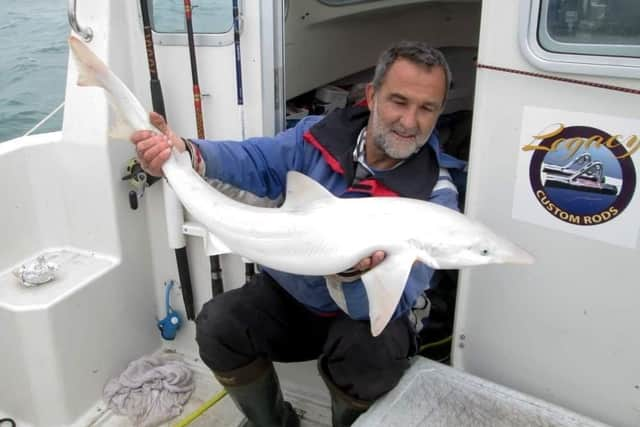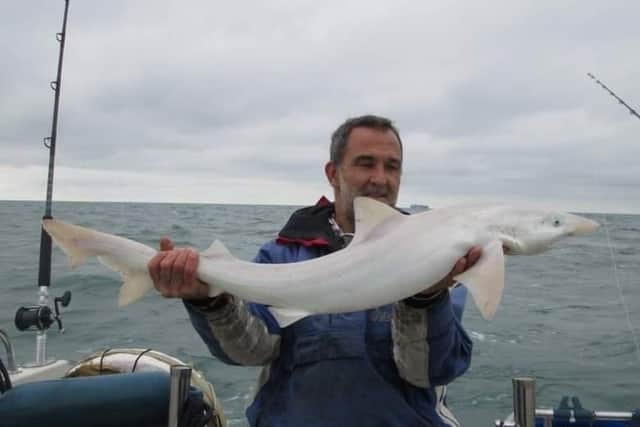Rare 'white' shark caught by Waterlooville angler off the coast of the Isle of Wight
and live on Freeview channel 276
However the fish is believed to be an albino white Tope shark with a pigment deficiency condition rather than the infamous great white species from the movie Jaws.
Jason Gillespie, 50, was shark fishing on his pilot house boat, Blue, when he felt a snag on his line. Along with friend Dean Farley, the pair were out for a day’s fishing above a wreck site off the coast of the Isle of Wight.
Advertisement
Hide AdAdvertisement
Hide Ad

Jason, from Waterlooville, said: ‘We had already caught a couple of Tope sharks which was unusual for this time of the year as they’re more common during the middle of summer.
‘However, when I saw this white shark I let out a series of expletives. I have been fishing for over 30 years and I’ve never seen anything like it.
‘As soon as we saw it we knew we had to get it on-board to get some photographic evidence.’
Over a metre in length and weighing an estimated 15 to 20lbs, Jason said he had ‘caught bigger sharks’ but had never seen anything as unusual as his latest catch. He has previously caught thresher and porbeagle sharks.
Advertisement
Hide AdAdvertisement
Hide Ad

He added: ‘I was so intrigued by the shark – it’s so unique and I just wanted to share the photographs.’
Albinism is a genetic condition affecting people and animals, causing a loss of pigmentation in the skin.
The condition is described as ‘highly rare’ in adult sharks due to making juveniles highly visible to potential predators.
Jason released it back into the ocean before returning to Gosport Marina.
Advertisement
Hide AdAdvertisement
Hide AdExperts at the University of Portsmouth’s Institute of Marine Sciences confirmed to The News they believed it was an albino shark.
Dr Sarah Marley, a senior lecturer in marine biology, said: ‘It certainly looks like an albino Tope shark.
‘The pure white body and pink-tinged extremities suggest albinism, which is the absence of any pigmentation or colouration.
‘The pink is the result of seeing blood vessels beneath the skin.’
Advertisement
Hide AdAdvertisement
Hide AdDr Marley said the likelihood of catching an albino specimen was very rare.
She added: ‘Albino animals are relatively rare to start with and also suffer lowered survival rates.
‘Their obvious colouration can be a disadvantage for camouflage, making it harder to find food or avoid predators.
‘As well as affecting their colouration, albino animals often have poorer eyesight or hearing which can also hinder survival.
‘The fishermen here had a lucky catch.’
Advertisement
Hide AdAdvertisement
Hide AdAlbinism has been reported in at least 16 shark and 11 ray species, she added.
A message from the Editor, Mark Waldron
Thank you for reading this story. The dramatic events of 2020 are having a major impact on our advertisers and thus our revenues.
The News is more reliant than ever on you taking out a digital subscription to support our journalism. You can subscribe here for unlimited access to Portsmouth news and information online.
Every subscription helps us continue providing trusted, local journalism and campaign on your behalf for our city.
Comment Guidelines
National World encourages reader discussion on our stories. User feedback, insights and back-and-forth exchanges add a rich layer of context to reporting. Please review our Community Guidelines before commenting.